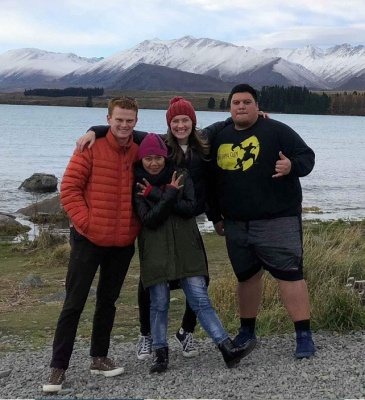A COUNTRY OF TWO HALVES
BATS Theatre, The Heyday Dome, 1 Kent Tce, Wellington
05/07/2018 - 07/07/2018
Production Details
Public performances of the Young and Hungry National Schools Tour 2018.
Directed by Patrick Davies, four professional actors present extracts from New Zealand plays that help us understand how the ‘other half’ live: whether it be the haves and the have nots, rural and city, or privileged and un-empowered.
This 50-minute bare bones programme of New Zealand theatre can open discussion about the misunderstandings that keep us divided and what brings us together.
The show includes extracts from:
The Debate by Riwia Brown
Ka-Shue (Letters Home) by Lynda Chanwai-Earle
Broken River by Ralph McCubbin Howell
The Tutor by Dave Armstrong
Urban Hymns by Mīria George
Revenge of the Amazons by Jean Betts
Wednesday to Come by Renée
Sham by Jess Sayer
All scenes have been edited with the permission of the playwrights. If you would like to see the original/ full length scripts, please contact Playmarket.
Or for full summaries visit: youngandhungry.org.nz/ensembleimpact/2018-play-extracts
Presented by Young and Hungry and featuring Laura Thompson, Ariadne Baltazar, Patrick Tafa and Liam Hughes.
BATS Theatre The Heyday Dome
5 – 7 July
at 6:30pm
All Tickets $15
BOOK TICKETS
Accessibility
*Access to The Heyday Dome is via stairs, so please contact the BATS Box Office at least 24 hours in advance if you have accessibility requirements so that appropriate arrangements can be made. Read more about accessibility at BATS.
Theatre ,
50 mins
Proves the efficacy of theatre with ‘less-is-more’ ingenuity
Review by John Smythe 06th Jul 2018
It’s a provocative title: Two Halves? Really? But it depends which way you slice it. As the skilled cast of four – Laura Thompson, Ariadne Baltazar, Patrick Tafa and Liam Hughes – play out snippets from eight New Zealand plays, it becomes apparent we each identify as, or with, something that puts us in opposition to others: it’s Me or Us v Them.
Riwia Brown wrote The Debate for the first Young & Hungry Festival in 1994, yet the question of whether the teaching of Te Reo Māori (recognised as an official language of Aotearoa New Zealand in 1987) should be mandatory in schools remains a hot topic of contention.
The moot is ‘That Māori should be the national language of New Zealand’ and the twist is that the Māori team is to argue against it while the Pākehā team argues for it, as they compete for the astutely-named Hobson Trophy. With a multicultural cast of four playing a range of roles, it’s the arguments for and against that come to the fore.
Excerpts from Lynda Chanwai-Earle’s solo play Ka-Shue (Letters Home) bookend a scene from Ralph McCubbin Howell’s Broken River. Ariadne Baltazar contrasts a young Chinese woman in 1959 seeking the right to escape from a shaming mother and controlling father with another in 1989, on a trip to Beijing, writing home to her mother and grandparents in NZ. Mention of protests in Tiananmen Square fer another Us v Them perspective.
One of director Patrick Davies’ many touches, to demonstrate theatrical conventions that differentiate live theatre from the screens that dominate the lives of the high-school target audiences, is to have Baltazar become a rock in the river Nick (Liam Hughes) and Brooke (Laura Thompson) step over, as they visit the site that’s about to be dammed to feed the irrigation needs of Canterbury farmland converting from sheep to dairy.
This sample from Broken River brings a whole new irony to ‘trickle down effect’ as we tune into the estrangement between two people who used to be childhood friends (before Nick went to the UK).
A mimed tug-of-war between the titular tutor Holten (Baltazar) and her reluctant ‘rich kid’ student Nathan (Hughes) introduces the first extract from Dave Armstrong’s The Tutor, where what you earn and the sort of car you drive emerges as the basis of how Holten measures ‘success’.
Meanwhile, on ‘the other side of the tracks’, schoolgirl and casual worker at the local petrol station, Jo (Thompson), is hanging out washing as she reveals to Tobias (Patrick Tafa) the family’s dire financial situation: the ‘have nots’ at the mercy of the ‘haves’.
Back with The Tutor, Nathan surprises Holten with his progress – and reveals the incentive system that driving it. While another scene from Urban Hymns sees Tobias drive Jo to commit a crime to supposedly solve their problems.
It should be noted that both Holten and Jo were written as male and the gender-reversing works just fine here. In fact I’d say it enriches the scenarios.
The high-stakes scene from Jean Betts’ revision of A Midsummer Nights’ Dream, Revenge of the Amazons, sees Amazonian Queen Hippolyta (Baltazar) explain to King Theseus (Tafa) why she can never believe a man could be equal to a woman. Written during an earlier wave of feminism, it’s satirical barbs speak powerfully to the contemporary focus on male privilege and abuse, and gender-issues in general.
The question of which is stronger is also addressed in a contrastingly naturalistic scene from Renée’s depression-era play Wednesday to Come, where Iris (Thompson) confronts the coffin of her dead husband.
A physical and highly comical theatricality informs the staging of a dinner-party argument over politics and our shared responsibility in the democratic process: a splendid way to end the 50-minute presentation.
Originally crafted for high school audiences, this brief end-of-tour season of A Country of Two Halves at BATS is eminently suitable for all ages, as is the Q&A session afterwards. At the very least it proves the efficacy of theatre in reflecting the timeless questions that affect each generation, the quality of our playwrights in meeting that need and the skill of these actors and director in bringing it all to life with ‘less-is-more’ ingenuity.
Copyright © in the review belongs to the reviewer







Comments